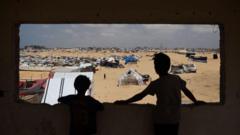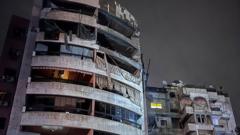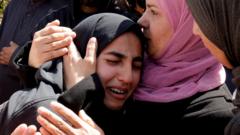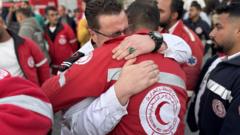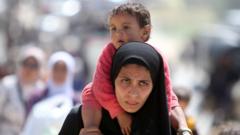Dr. Mark Perlmutter highlights dire conditions for wounded Palestinians amid Israeli military operations, underscoring the critical need for humanitarian aid.
Wounded Palestinians are dying from lack of medical supplies in Gaza, expert warns
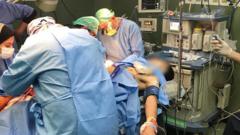
Wounded Palestinians are dying from lack of medical supplies in Gaza, expert warns
Serious shortages of medical items are leading to needless fatalities, says US surgeon working in the region.
An urgent call for support has been made by American surgeon Dr. Mark Perlmutter, who has been working in two hospitals in Gaza for the past three weeks. He reports that many wounded Palestinian patients are dying due to severe shortages of medical supplies, including basic necessities such as soap, antibiotics, and x-ray services, as Israel resumes its offensive against Hamas.
Dr. Perlmutter, who has been part of a World Health Organization (WHO) program through the organization Humanity Auxilium, described a particularly harrowing case of a 15-year-old girl who suffered grave injuries from Israeli machine gun fire while riding her bicycle. His recounting highlights the stark reality of working in such dire circumstances, where patients are faced with overwhelming injuries and medical teams lack the essential tools to effectively treat them.
The ongoing Israeli military operations aim to compel the release of hostages held by Hamas. However, the impact on civilian life has been devastating. The Israeli government maintains that its strikes target military objectives; yet, Dr. Perlmutter's experiences tell a different story. He recounted tragic accounts of two 15-year-olds who sustained life-altering injuries in separate incidents involving rocket fire from Israeli apache helicopters. One girl suffered the loss of limbs, while a boy had to endure the amputation of a foot following an attack on his car—a situation he was in after military evacuation warnings.
In a statement, the IDF contended that it does not deliberately target civilians and adheres to international law while conducting operations. Despite their assertions, Dr. Perlmutter expressed a deep concern over the hospital conditions, suggesting that many of the wounded could have been saved in better-equipped medical facilities.
Dr. Perlmutter also emphasized the critical role played by Palestinian medical staff, who continue to work tirelessly under traumatic conditions, risking their lives daily to provide medical assistance with little to no resources. He referenced the emotional strain that Palestinian healthcare workers endure, describing how they continue working without pay and support while dealing with flooding casualties. Most hospitals in Gaza are either non-functional or barely operational due to sustained conflict and blocked supply routes.
Tom Fletcher, UN humanitarian chief, indicated that the situation in Gaza has reached crisis levels, with vital supplies trapped behind closed borders for months. He called on the international community to uphold humanitarian principles to help those in dire need.
As the Israeli military operations continue, Dr. Perlmutter warns that without urgent medical supplies, the death toll among Palestinians from potentially treatable wounds is set to rise dramatically. Reports from the Hamas-run health ministry indicate an alarming number of fatalities, particularly among children, leading to increased calls for humanitarian aid and intervention from global leaders.


